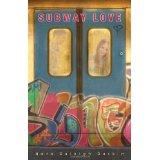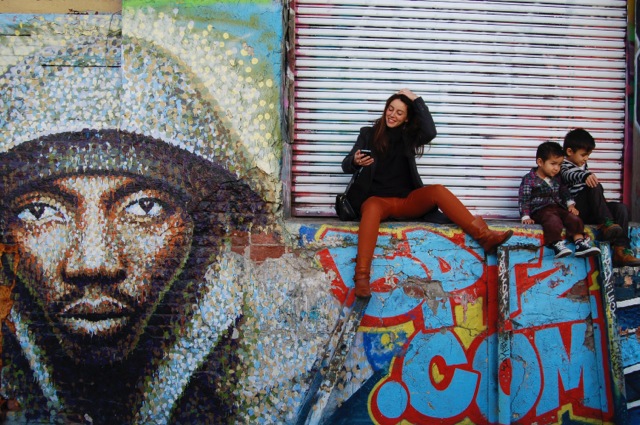
Subway Love by Nora Raleigh Baskin is a page-turner of a short novel designed to skillfully encourage both family and classroom discussion of difficult topics such as divorce, abuse, first love, intermarriage, and coping with the end or loss of both casual and important relationships. For example, is someone you once loved and haven't seen in decades being almost unconsciously scanned for by your soul, almost everywhere you go? What if that person suddenly emerged out of the pages of time?
What would you do? Do you remember what it is like to break up with a first love, or have that person just disappear from your life? Has someone's existence called to you or someone you love in ways that led or lead to risk-taking in order to connect? What if a parent doesn't appear safe to talk to about what happening in your life? What if in a second relationship s/he brings into your home who abuses you and your safety isn't a family first priority?
Nora Baskin, known for tackling difficult subjects in her writing, again provides healthy material rich in graphic language and encounters that is helpful to eliciting inter-generational honesty in the discussion of real relationships. Parents, whether married or divorced, would surely provide a very different narrative about our exhausting struggles to care for our children. Baskin's revealing a view of the world after divorce, affords youth and adults an honest plane for discussion "about the characters" that can help deepen relationships within schools, youth groups, camps and families in potentially life-saving ways.
Graffiti is a metaphor that travels throughout Subway Love. Set in 1973 when we read, right in the narrative of Subway Love that:
Mayor Lindsay had declared war and...well over fifteen hundred New York City youths had been arrested for vandalism. He called the graffiti 'demoralizing and,' and he said the graffiti writers were "insecure cowards" seeking recognition, though nothing could have been further from the truth.
 So it is that Subway Love debuted just as New York City's mayor refused protection to Five Pointz, an empty commercial building that had become a community gathering point for community musical events, local meet-ups and some of the best examples of the art of graffiti in the United States. While such sites are often protected in Canada and England, after a period of festivals held on the site, the ultimate message of graffiti and Subway Love--of life's impermanence--was realized. The buildings were white-washed to abruptly halt the efforts at advocacy and adulation in the press of the art, and then expediently demolished to make way for high rise rental apartments. Perhaps impermanence is necessary to define both graffiti and life. The opportunity to reflect upon this reality, as afford to us by Subway Love, is another important entry point provided by the author. [photo credit: Barry Bub]
So it is that Subway Love debuted just as New York City's mayor refused protection to Five Pointz, an empty commercial building that had become a community gathering point for community musical events, local meet-ups and some of the best examples of the art of graffiti in the United States. While such sites are often protected in Canada and England, after a period of festivals held on the site, the ultimate message of graffiti and Subway Love--of life's impermanence--was realized. The buildings were white-washed to abruptly halt the efforts at advocacy and adulation in the press of the art, and then expediently demolished to make way for high rise rental apartments. Perhaps impermanence is necessary to define both graffiti and life. The opportunity to reflect upon this reality, as afford to us by Subway Love, is another important entry point provided by the author. [photo credit: Barry Bub]
The question of whether the main characters are intent on breaking the law at points or doing mitzvot, or simply engaging in self-expression, is likely to be one of many riveting discussions based on Subway Love to hold with teen readers. Subway Love dovetails beautifully with Jewish topics such our core ethos of mitzvah-centered living and core challenges, such as our struggles with victimization.
In this age of therapy adult personal struggles are typically support most often in therapy behind closed doors, leaving youth clueless of how to cope in their own lives. Our youth are too often supported through the peer alternative of immature "wise guys" than mentoring by truly wise guides. Training programs are emerging to ensure Jewish educators, understandably reluctant to serve in this way until they are trained, become skillful in guiding young lives. Baskin's writing highlights the importance of community-based mentors who are truly available to listen deeply to our youth and mentor them on the journey called life. Subway Love is an honest, important short novel best used in settings of skillful dialogue and safe rapport.
This review of Subway Love by Rabbi Goldie Milgram first appeared in the Philadelphia Jewish Voice where she serves as Living Judaism and Book Review Editor